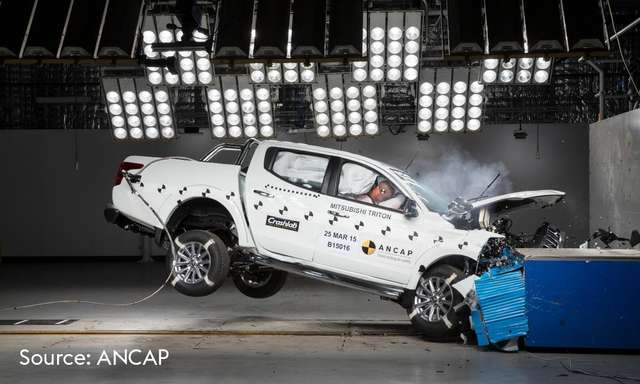- fleet
ANCAP Raises Safety Bar

Updated 15 Mar 2023
Paul Oliver

To bring Australia in line with the stricter safety protocols of its European counterparts, last year ANCAP SAFETY announced that a rating validity period would be applied to all vehicles rated by ANCAP prior to 2018.
Background
This is a result of the different set of assessment criteria/protocols that ANCAP used until the end of 2017 which were less stringent than its European cousin; Euro NCAP. This had caused some inconsistencies in ratings for vehicles tested in both Europe and Australia.
Also, Safety Ratings for vehicles assessed by ANCAP prior to 2018 were not subject to a validity period. Therefore, the only mechanism for those ratings to expire was the introduction of a new model.
ANCAP determined that the presence of older ratings had the potential to create confusion among consumers, and inappropriate comparisons between vehicles designed and rated against vastly different protocols.
Vehicle Safety Testing
Since January 2018, all vehicles rated by ANCAP have been evaluated against four key assessment criteria:
- Adult Occupant Protection
- Child Occupant Protection
- Vulnerable Road User Protection
- Safety Assist
A range of tests are conducted for each area, with each vehicle required to meet minimum score thresholds for each star rating level.
First Vehicles Expired
As fireworks lit up the sky on 1 January 2023, we not only said goodbye to 2022 but all ANCAP Safety Ratings on vehicles with a rating date stamp from 2015 or earlier!
Do you have any of these vehicles in your fleet? At 7+ years old it certainly wouldn’t be unusual, particularly for Light Commercial Vehicles such as Utilities.
The trouble lies in the fact that Light Commercial Vehicles (Utilities & Vans) have always lagged behind Passenger Vehicles in gaining the latest vehicle safety technology to obtain the maximum 5 star ANCAP rating.
More To Come
So, with an eye on the long lead times in place to obtain new vehicles, what other ANCAP Safety Ratings will lose their validity period next? See the attached Table which shows how the 2016 and 2017 rated vehicles will progressively drop off.
ANCAP RATING ‘DATESTAMP’ |
RATING EXPIRY DATE |
2016 |
31 December 2023 |
2017 |
31 December 2024 |
Industry Consultation
It should be remembered that ANCAP plays a key role in encouraging Manufacturers to build and bring the safest vehicles to our shore!
Accordingly, they consulted with industry in relation to the introduction of this policy, specifically consulting with brands likely to be most affected (i.e. those with volume-selling models which hold a date stamp of 2017 or earlier).
Benefits
Through the introduction of this policy, ANCAP expected numerous benefits, including:
- Aligning the validity of ANCAP safety ratings with the typical average model lifecycle of Passenger Vehicles and SUVs
- Encouraging fleet buyers to purchase newer vehicles with improved safety specifications
- Introducing consistency in rating validity (6 years) across all ANCAP safety ratings
- Providing consumers with a greater ability to compare the safety of vehicle models
- Encouraging Manufacturers with longer product lifecycles to upgrade the safety specifications of existing models
- Establishing clear guidance for Manufacturers to enable appropriate product planning
Business/Consumer Considerations
Through this policy change and their consistent increase in vehicle safety standards necessary to achieve maximum safety ratings, ANCAP has clearly ‘raised the bar’ both for Manufacturers and organisations with fleets that hide behind old vehicle safety ratings.
Based on today’s safety standards and the constantly evolving technology there is just no comparison between a vehicle awarded a 5 star rating 6+ years ago and a vehicle awarded the same 5 stars more recently.
Businesses will need to consider their vehicle replacement plans, taking into account the age and safety ratings of their fleet vehicles to not only meet their Work Health and Safety ‘duty of care’ but also their fleets’ public image. Some customers are increasingly becoming conscious of ethical issues such as sustainability and corporate responsibility, and having a fleet comprised solely of newer models can make a company seem more attractive - not just to potential customers but also potential employees who may be drawn towards companies that demonstrate ethical values.
This article was written for AutoGuru by Paul Oliver, Director/Principal Consultant of Fleet Advisory - Australia’s leading fleet management consultancy. Fleet Advisory provides independent expert advice and consulting services to range of businesses, not for profit organisations and government.

Written By
Paul Oliver
Paul Oliver is the Director/Principal Consultant of Fleet Advisory.
Paul spent 25 years working in the Fleet Management and Automotive industries in both wholesale and retail operations before establishing Fleet Advisory. During this time, he held a variety of senior leadership roles in Sales, Relationship Management, Operations, Product Development, Process Improvement, Distribution Channel Development and Innovation.
His formal qualifications include a Master Of Management and Postgraduate Diploma in Financial Management from Macquarie University, along with Agile Project Management, Lean Six Sigma and Accounting certifications.
Fleet Advisory provides independent expert advice that enables organisations to achieve cost savings, mitigate risks, utilise technology, improve operating procedures and train staff to implement an improved fleet management capability, either in-house or via a Fleet Management Organisation (FMO).
Since inception, Fleet Advisory has worked with a range of domestic and international businesses, not for profit organisations and government entities. The business distinguishes itself through its high level of customisation based on the differing needs of each organisation it works with.